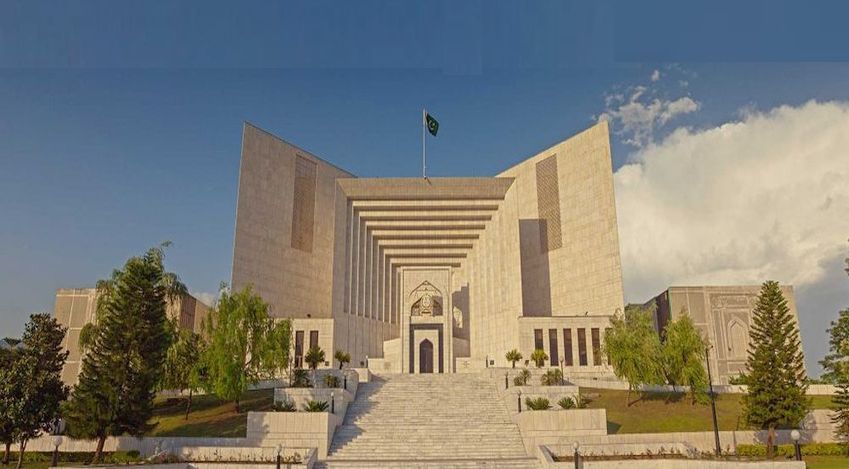The High Court can exercise its Revisional Jurisdiction Suo Motu to ensure Effective Superintendence and Visitorial Powers for the Safe Administration of Justice --- Supreme Court of Pakistan
Islamabad 30-04-2024: The Civil Petition No. 423-L of 2018 was heard by three Member Bench consisting of Honourable Chief Justice Qazi Faez Isa, Mr. Justice Muhammad Ali Mazhar and Ms. Justice Musarrat Hilali. According to the concise facts of the case, the petitioner and respondent No.1 executed a partnership deed on 29.08.1997 for a petrol pump business. After some passage of time, a dispute arose between the parties and in order to resolve the dispute, respondent No.2 was appointed as arbitrator. Subsequently, on 21.05.2001, respondent No.2 announced the award. The petitioner filed an application before the Civil Court, Chiniot, for declaring the award as the rule of the Court but the learned Trial Court remitted the award back to the arbitrator to decide the matter afresh, which order was challenged in an appeal. The Additional District Judge, Chiniot, was allowed the appeal, but in an earlier Civil Revision, the matter was remanded. After remand, the Additional District Judge upheld the order of the Trial Court dated 28.09.2005. Thereafter, the petitioner preferred Civil Revision No.3054/2012 in the Lahore High Court. On 09.02.2016, the civil revision was fixed in the High Court, where the counsel for the petitioner did not press the revision due to lack of instructions and on his statement, the revision was disposed of by the High Court with the observation that if in case of any live issue, the petitioner may file application within 60 days for the revival of the civil revision. The petitioner came to Lahore and visited his counsel’s office, where his clerk disclosed that the civil revision has been disposed of due to lack of instructions. After collecting information, the petitioner immediately filed application for the revival of the civil revision, but the office raised objection which was placed in Court, and vide impugned order dated 28.11.2017, the High Court sustained the office objection and dismissed the application.
It is observed by the Supreme Court of Pakistan that the bone of the contention is that the Civil Revision was dismissed by the High Court due to lack of instructions on 09.02.2016 with the rider that the petitioner may move an application within 60 days for resurrection of the case. When the application for revival of the proceedings was filed, the office had raised objection vide Diary No.45031/2017, and on 28.11.2017, the application was dismissed. The reasons for declining the application for restoration of Civil Revision were: (1) the revision petition was dismissed due to lack of instructions with the rider that the petitioner may apply for revival within 60 days, but the application was filed after about 18 months; (2) it was the duty of the petitioner to be vigilant in pursuing his case and; (3) the petitioner was obliged under the law to explain each and every day of the delay but he has miserably failed to do so.
The language used under Section 115 of the Code of Civil Procedure, 1908 (“C.P.C.”) unequivocally visualizes that the revisional court has to analyze the allegations of jurisdictional error, such as when an exercise of jurisdiction is not vested in the court below, or a jurisdiction that is vested in it by law was not exercised, and/or the court has acted in exercise of its jurisdiction illegally or with material irregularity, or committed some error of procedure in the course of the trial which is material and has affected the ultimate decision. The Court can even exercise its suo motu jurisdiction to ensure effective superintendence and visitorial powers to make sure, by all means, the strict adherence to the safe administration of justice, and may correct any error unhindered by technicalities.
While granting 60 days’ time for applying for the restoration or resurrection of the revision petition which was dismissed by the High Court in default or for non-prosecution, the High Court disregarded Article 181 of the Limitation Act wherein the restoration could have been filed within 3 years when the right to apply accrued. Therefore, the fixation of time or limitation of 60 days by the Court is tantamount to curtailing or restricting the statutory period of 3 years to only 60 days which was unwarranted and in excess of jurisdiction.
Finally it is held by Supreme Court of Pakistan that the Civil Petition is converted into an appeal and allowed. The impugned order dated 28.11.2017 passed by the Lahore High Court is set aside and the civil revision is restored. The learned High Court is directed to decide the civil revision on merits after issuing notice to the parties.
Powered by Froala Editor








